- California Assembly OKs highest minimum wage in nation
- S. Korea unveils first graphic cigarette warnings
- US joins with South Korea, Japan in bid to deter North Korea
- LPGA golfer Chun In-gee finally back in action
- S. Korea won’t be top seed in final World Cup qualification round
- US men’s soccer misses 2nd straight Olympics
- US back on track in qualifying with 4-0 win over Guatemala
- High-intensity workout injuries spawn cottage industry
- CDC expands range of Zika mosquitoes into parts of Northeast
- Who knew? ‘The Walking Dead’ is helping families connect
Korea voices deep regret over Japan’s review of sex slavery apology
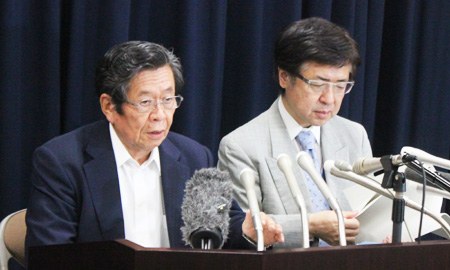
Keiichi Tadaki, left, former Japanese Prosecutor-General, announces the results of a re-examination on the Kono Statement at the Government Complex in Tokyo, Friday. Sitting next to him is Nobukatsu Kanehara, assistant chief cabinet secretary. (Yonhap)
SEOUL/TOKYO (Yonhap) — South Korea on Friday expressed deep regret over Japan’s review of its 1993 statement acknowledging its wartime sexual enslavement of women, saying the results could undermine the credibility of the apology.
A team of experts appointed by the Japanese government reviewed the background to the so-called “Kono statement,” which acknowledged and apologized for the Japanese military’s “coercion” of women into sexual slavery.
Amid criticism that Tokyo was attempting to backpedal on its official apology, Japan announced late in the day that Seoul and Tokyo officials had fine-tuned the sensitive wording of the statement.
Although Japan said that there is no change in its stance not to revise the statement, Seoul’s foreign ministry said the results of the review had misleading content that undercut the credibility of the statement, and urged Tokyo to sincerely resolve the issue.
“We have clearly maintained the stance that verification of the truth is not a subject of negotiations between the two countries. We provided our opinion unofficially upon repeated requests by Japan,” the Korean foreign ministry said in a statement.
South Korea said that the international community will not tolerate Japan’s acts of hurting victims’ wounds, adding that Seoul will take appropriate actions down the road.
Japan’s move is feared to further deal a blow to already chilly relations between Seoul and Tokyo as the statement could be seen as the outcome of political mediation between the two, rather than a reflection of the historical facts of Japan’s wartime atrocities, experts say.
The Kono statement, issued by then Japanese cabinet secretary Yohei Kono, has been a key element of the basis of relations between Seoul and Tokyo, together with a broader 1995 apology for the colonial occupation, known as the “Murayama statement.” The 1993 statement was written based on accounts from 16 Korean victims.
Seoul’s foreign ministry has said that the Kono statement was made based on Tokyo’s own investigations and judgment. The Seoul government has repeatedly reiterated that if Japan announces results that “undermine” the spirit of the statement, it will aggressively take action by offering historical evidence.
Historians estimate that up to 200,000 women, mainly from Korea and China, were forced to work at front-line brothels for Japanese soldiers during World War II. The victims are euphemistically called “comfort women.”
Almost all of the women, now elderly, have already died, increasing worries that the remaining victims may also pass away before Japan makes atonement. Only 54 victims remain alive in South Korea, with their average age standing at 88.
South Korea demands that Japan show sincerity by settling the issue “effectively and in a way that is agreeable to the living victims,” including through an apology and compensation.
Japan has long dismissed Seoul’s demands, claiming that all grievances related to its 1910-45 colonial rule of the Korean Peninsula were settled through a 1965 treaty that normalized their bilateral ties.
Relations between Seoul and Tokyo have reached their lowest ebb in recent years because of the latter’s stance of historical grievances and its territorial claims to the South’s easternmost islets of Dokdo.
Japanese Prime Minister Shinzo Abe has also angered neighboring countries through words and actions perceived as aggressively nationalist. In late December, he paid a visit to the controversial Yasukuni war shrine, which honors a number of Class A war criminals along with millions of other Japanese war dead.
Abe has said that there is no evidence that Japan’s imperial army was involved in the coercion of such women into sexual slavery during World War II.
Apparently mindful of fierce criticism from its neighboring countries, Abe promised in early March to honor Japan’s two apologies for its colonial rule.







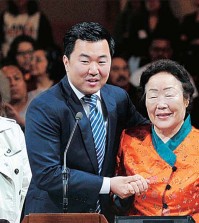
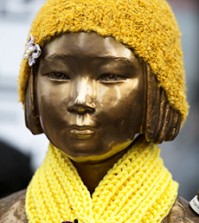
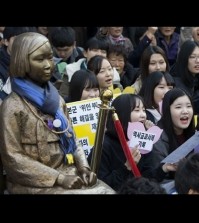
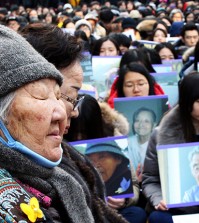





konohazuku001
August 2, 2014 at 10:12 PM
Based on these following facts,there was no Korean comfort-woman unwillingly kidnapped by Japanese army or officials.
1.No one knows the names of the villages or towns where the comfort-women were actually kidnapped.
2.So far as the comfort-women kidnapping issue is concerned, there is no obvious record which had been written before 1990s.
3.It is quite strange that so many as 200,000 victims had kept silence from 1945 to the 1990s.
4.A large amount of money were paid to the Comfort-women in reward for their jobs. Back in those days,it was not a rare case that poor parents necessarily sold their daughters to get money.
5.There have been no witnesses who can testify the kidnapping incidents. If there had been many comfort-women who were kidnapped, there must have been many witnesses. But nobody saw the incident.
6.There was no real testimony by the kidnappers. It was already proved that Seiji Yoshida’s testimony was absolutely false statements. At that time in Korea, most of policemen and officials were Koreans, not Japanese.
7.There was no protest opposing to the kidnapped comfort-women.If there had been kidnapped comfort-women as real events, riots must have been raised.
8.In Korea, from time immemorial to now ,there always have been many prostituts. In the period of the World WarII,it is quite natural that there must have been prostitution markets there.
9.Most of Korean comfort-women say “I was sold.” or “I was deceived.” A small number of women say “I was kidnaped.” The credibility of their testimonies are in question. The contentions are rather suspect evidences.
10.Although The Japan-Korea Basic Relations Treaty was concluded in 1965, South Korea currently lodges various reasons in order to draw out as much money as possible from Japan.
However,at the time of the conclusion of the treaty, they never argued about the comfort-women issue at all.